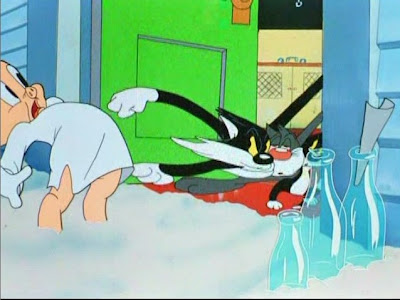

An awful lot of Theory Corner people also read John K's blog, so I'll assume that people here are familiar with the excellent article, "Milt Gray on Clampett" that was serialized there recently. If you're not, then try the June 3 and May 12 installments at http://johnkstuff.blogspot.com/
Anyway, if you're like me you were frustrated beyond endurance when John wasn't able to run the final installment. He just didn't have time. Well, I have time, so here it is, complete with pictures chosen by the author. It's a preeeety interesting piece, something that oughta stir things up a bit. Enjoy!
MILT GRAY ON CLAMPETT (CONCLUSION)
In 1941 Bob is finally rewarded for his successes -- he is given the best color unit when Tex Avery leaves to go to M-G-M. Bob’s first cartoons are completing the cartoons that Tex had begun. Since it takes about nine months to complete a single cartoon, and a cartoon is in each stage of production (story, design and recording, layout, animation, inbetweening, etc.) only about five to six weeks, that means that each director has at least a half dozen cartoons in production at any given time, each one in a different stage of production. So Bob inherited several Avery-created cartoons, which share Avery’s and Bob’s sensibilities to some degree. But once Bob begins cartoons created entirely by himself, he sets a level of creativity and originality that has never been equaled. Every Clampett Warner cartoon from this time on is a unique new subject. On those rare occasions that Clampett does use an established formula -- like Bugs racing the tortoise -- he adds some really over-the-top elements that lift the cartoon(s) to a whole new level.



Clampett was always reaching for the new and unexpected, and not just copying things that were well done before. He was always focused not only on fresh subjects, but also on eccentric (and precise) acting, and visual surprises for the audience. He was, in his heart, an enthusiastic entertainer.





He never took the easy way, and his animators had to share his ambition or be replaced by someone who was eager to do his very best. For example, Virgil Ross, an excellent animator, admitted many years later that although he liked Bob and admired his work, he just wasn’t willing to do all the ambitious things that Bob always asked for, and so Virgil volunteered to be traded into the Freleng unit where the standards were much lower and the work much easier.
The only other director at Warners to come close to Bob’s level of energy was Frank Tashlin, on his third stint at the Schlesinger Studio, from about 1942 to 1944. Friz and Chuck struggled to try to keep up, and were extremely relieved when Bob left Warners to pursue an independent career. In Bob’s absence, the energy in the Warner cartoons quickly dissipated, as Friz and Chuck relaxed by making mostly cartoons in which the characters just stand around and talk (like Duck, Rabbit, Duck).







Chuck Jones once commented on the Clampett cartoons: “Most filmmakers pace their films by starting with a relaxed tempo, introducing the characters, and then gradually increase the tempo until they reach the climax on a high crescendo. But Bob Clampett was different. Bob would start his films at the top -- and from there he would go up!”



I think one of the biggest reasons that Clampett has so seldom gotten the recognition he deserves, especially for his 1940s Warner cartoons, is that critics and cartoon historians (including myself) have been largely unable to even describe in words what Clampett excelled at. By contrast, Friz and Chuck were primarily concerned with “respectability”, and so whatever the “rules” of filmmaking were -- which were already described in words in books and magazine articles even by the mid 1930s, and therefore ready-made for critics and historians to reference -- Friz and Chuck were anxious to adhere to. Plus, Friz and Chuck were focused on a linear exposition of story structure, with dialog that defined character -- which is also easy for critics and historians to write about. Clampett was certainly aware of these “rules”, but did not make himself a slave to them. Instead, Clampett was much more of an innovator, and his innovations were largely in the visceral areas of expressive movement, and the use of color, sound and cutting, that convey or resonate emotions in non-literal, purely intuitive ways. He let himself be guided by his emotions as much as by his intellect. These are the things that make movies powerful, and unique from books (or even comic books), but they are almost impossible for critics or historians to describe in words. As a consequence, these achievements that Clampett excelled in are almost never written about, while the works of Chuck and Friz are easy to describe and to praise. This, then, has left Clampett relatively defenseless against Chuck’s smug accusations that “Clampett was an irresponsible renegade who never followed the rules.” Frankly, the “rules” are for beginners. =
[That's the end of the article, but you might be interested in a couple of captions Milt wrote for the final five pictures. Check them out below].


CAPTIONS:
About the pictures of Porky and the cats on the doorstep, Milt writes: "From Kitty Kornered: Clampett anticipates color with color: The open door is yellow, reflecting the warm light inside the house; the closed door is white, reflecting the cold light of the winter snow; but the inbetween door is green -- giving an extra snap to the changes of color."
About the final two pictures where the cat bashes into the closed door, Milt writes: "From Kitty Kornered: Two successive frames within the same scene: As the cat leaps at the door, the background changes perspective for additional impact to our senses."





























